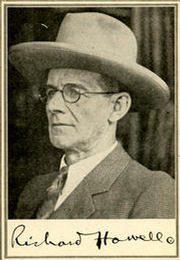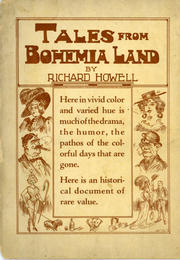 Richard Howell
Richard Howell
 Richard
Howell joined Bridgeport’s Sunday Herald in 1888 and quickly rose through
the ranks. The Herald’s publisher and owner was F.R. Swift, a consummate
sportsman who apparently spent as much time hunting and fishing in Florida as he
did running a newspaper in Connecticut. The two hit it off; Howell
was a sportsman too. Howell, in fact, was a sportsman’s sportsman. In his time,
he was widely acknowledged as one of the most knowledgeable
sportsman/journalists in the world. He often signed his articles as “The Old
Sportsman.” The sport that he seemed to favor in the pages of the Herald
was boxing.
Richard
Howell joined Bridgeport’s Sunday Herald in 1888 and quickly rose through
the ranks. The Herald’s publisher and owner was F.R. Swift, a consummate
sportsman who apparently spent as much time hunting and fishing in Florida as he
did running a newspaper in Connecticut. The two hit it off; Howell
was a sportsman too. Howell, in fact, was a sportsman’s sportsman. In his time,
he was widely acknowledged as one of the most knowledgeable
sportsman/journalists in the world. He often signed his articles as “The Old
Sportsman.” The sport that he seemed to favor in the pages of the Herald
was boxing.The Sunday Herald split into two weekly newspapers in 1896 – the Bridgeport Herald and the Waterbury Herald – and Howell became the managing editor of both. In 1919, the Bridgeport Herald became a daily newspaper with Howell as editor and publisher. In 1926, the two Heralds were once again combined under Howell’s editorial direction. Howell remained with the papers for over forty years, running them for most of that time.
Howell was a thoroughly respected newspaperman. He was active in local politics and was considered a liberal Democrat by his friends and a socialist by his detractors. He wrote in favor of Women's rights and used the Herald to push through several bills on education, the treatment of orphans, and other public-minded legislation. He wrote often on the plight of the poor. Although respectable, he wasn't a starched shirt. The woman he married in 1915, Catherine Blair Eggleston, was a vaudeville performer known as "Billy Cree." That says something about the company he kept.
 Catherine
died in 1928 and Richard took some time off from the Bridgeport Herald to
collect some of his favorite articles into a book entitled Tales from Bohemia
Land. Bohemians, in those days, were defined as “socially unconventional
people” and the geographical area between New York City and western Connecticut
– including Bridgeport – was teaming with them. Howell was fond of these folks
and counted himself as one of them, as his book plainly shows. Although Howell
does not mention Gustave Whitehead in Bohemia Land , the book makes it
clear why Howell published an
article about him in the newspaper. Whitehead was Howell’s kind of people. The dust cover of
Tales from Bohemia Land promises, “Here are real characters as picturesque
and bizarre as ever graced the pages of our best fiction.”
Catherine
died in 1928 and Richard took some time off from the Bridgeport Herald to
collect some of his favorite articles into a book entitled Tales from Bohemia
Land. Bohemians, in those days, were defined as “socially unconventional
people” and the geographical area between New York City and western Connecticut
– including Bridgeport – was teaming with them. Howell was fond of these folks
and counted himself as one of them, as his book plainly shows. Although Howell
does not mention Gustave Whitehead in Bohemia Land , the book makes it
clear why Howell published an
article about him in the newspaper. Whitehead was Howell’s kind of people. The dust cover of
Tales from Bohemia Land promises, “Here are real characters as picturesque
and bizarre as ever graced the pages of our best fiction.”